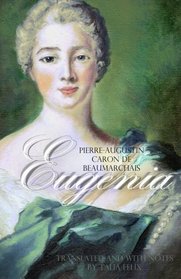Search -
Eugenia: Eugénie
Eugenia Eugnie
Author:
EUGENIA is the Latin form of a name derived from the Greek eugenes meaning “well born.” As Greek was part of a regular gentleman’s education in the 18th century, this would not have been lost on the audience of de Beaumarchais. The whole theme of his play is really that of good breeding and high birth: the Earl is favored by Dame Murer and... more »
Author:
EUGENIA is the Latin form of a name derived from the Greek eugenes meaning “well born.” As Greek was part of a regular gentleman’s education in the 18th century, this would not have been lost on the audience of de Beaumarchais. The whole theme of his play is really that of good breeding and high birth: the Earl is favored by Dame Murer and... more »
ISBN-13: 9781461061922
ISBN-10: 146106192X
Publication Date: 4/25/2011
Pages: 132
Rating: ?
ISBN-10: 146106192X
Publication Date: 4/25/2011
Pages: 132
Rating: ?
0 stars, based on 0 rating
Genres:




